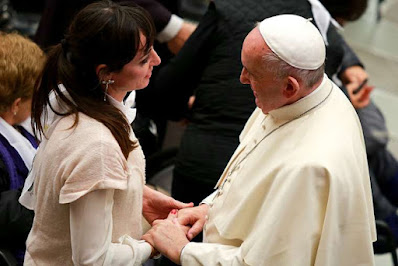Pope Francis wrapped up this phase of the so-called “synod” with
an address that handed out some mild praises and a bunch of bitter complaints,
as usual (link).
He appealed for an appreciation of the feminine aspect of the
Church, and urged the clergy to recognize it, saying: “When ministers go too
far in their service and mistreat the people of God, they disfigure the face of
the Church with macho and dictatorial attitudes (it is enough to recall the
intervention of Sr. Liliana Franco).”
Sr. Franco leads an organization of religious orders in Latin
America, and she spoke at the event about the painful experiences of women. She
said that “the journey of women in the church is full of scars.”
The Pope also urged everyone to
think of the Church as a body of people, “the faithful people of God,” including its members with all their strengths and weaknesses, and not as a
bureaucratized organization performing religious functions. “When pastoral
workers take this second path, the Church becomes the supermarket of salvation
and the priests mere employees of a multinational corporation.” He called the latter pattern “the great defeat to which
clericalism leads us”, and cited an image of commercialized religion: “It is
painful to find in some parish offices the ‘price list’ of sacramental services
in the manner of a supermarket.”
That does sound shocking. Does
he mean that some parishes display such a list openly, and would deny the rites
of the church to someone who doesn’t make a donation? That’s so strange that I’d
find it hard to believe: I’d want the local bishop to correct any such cases.
If it’s still going on, why hasn’t Pope Francis put a stop to it? Or is he talking about something
more understandable? It might be a list of suggested donations that is written
down for the parish staff, so that people arranging an event won’t be given
arbitrary suggestions about donations. So Pope Francis might be complaining
about something really bad, or maybe just putting a bad interpretation on
something innocuous.
Sometimes Pope Francis is hard
to understand.
Elsewhere in the news today, something else hard to understand
happened.
The artist and former Jesuit priest Marko Rupnik, who was briefly
excommunicated for a sacrilegious treatment of confession, and soon restored; a
priest who is reported to have been credibly accused, by dozens of religious
sisters and other women, of abusing his role as a spiritual advisor so that he
could engage in a twisted sexual contact with those women; a priest expelled from the
Jesuits for disobedience and therefore with no authorization to conduct
religious ministry; a priest who could have been put on trial for his
misconduct if Pope Francis had been willing to waive a regulation that he often
has waived before: this priest has been taken off Rome’s hands as a problem. He
was accepted to join a diocese in his home country, and therefore gained
authorization to administer the sacraments again, without having to face trial
for the remaining very serious complaints against him. (See story here; it has been covered by many outlets already.)
To me, this, this action, is “the great defeat to which
clericalism leads us”. Some bishop in the home country is taking in this
Rupnik, this very visible and apparently wickedly corrupt priest, and I don’t
think he could do it without the consent of Vatican officials.
But Pope Francis did not mention or even allude to Rupnik (or anyone else like him) in his talk. Instead, he lamented
what he personally thinks is “the great defeat to which clericalism leads us. And this is
very sad and scandalous: it is enough to go to ecclesiastical tailor’s shops in
Rome to see the scandal of young priests trying on cassocks and hats or albs
and lace-covered robes.”
It’s hard for me to escape the
notion that Pope Francis does not like young priests. These days they are often
men influenced by Pope John Paul II and Pope Benedict, and they love the
orthodox Catholic faith taught by the apostles, they love the Church’s
traditions of culture and liturgy. And Pope Francis thinks it’s a scandal. A
scandal is an action that leads others into sin: apparently he thinks that
young priests buying traditional hats in Rome are leading others to sin. He’s complained
about this repeatedly during his pontificate.
So Fr. “Rapenik,” as he has been
called (not without reason), is being restored to normal standing as a priest, and that’s not a
scandal worthy of mention; but cassocks and albs are a problem bad enough to complain about before the entire Synod assembly?
It’s a good thing, after all, that Pope Francis has compassion for women.
